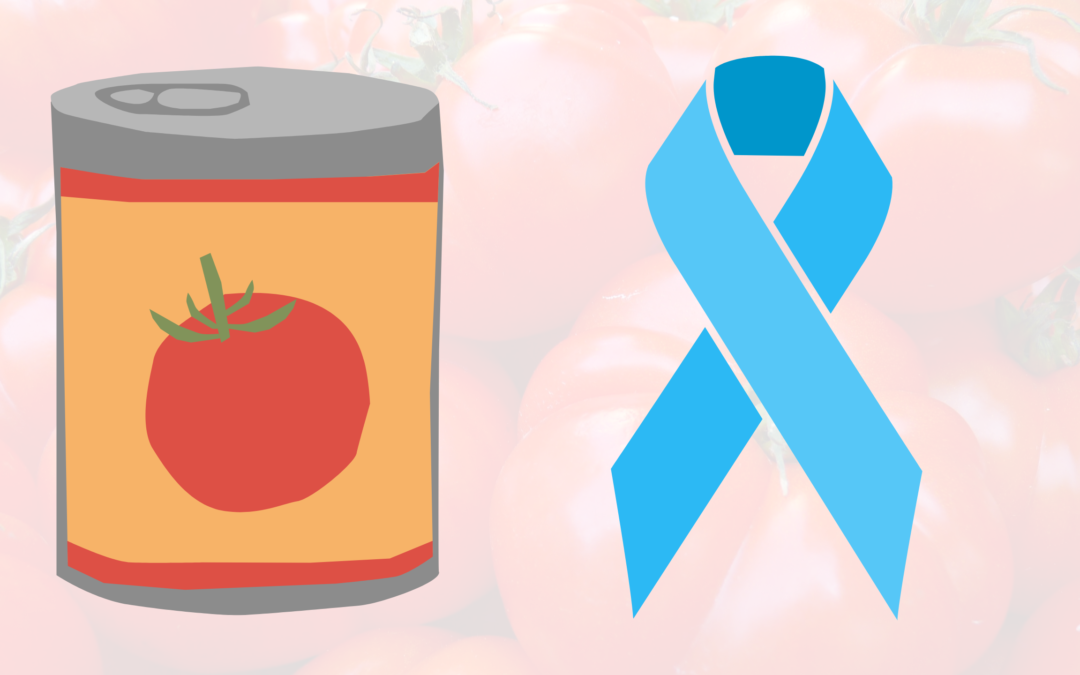Canned tomatoes can be a great benefit to men’s health. Go red for Movember and learn more about the power of tomatoes in our battle against prostate cancer.
It’s Movember – which means during the month of November, we are bringing awareness to men’s health. According to the Movember website, approximately 10.8 million men across the globe have been diagnosed with prostate cancer. That does not even include other health implications like testitular cancer and men’s suicide.
The Movember organization has many ways to support the movement of men’s health and the research involved in the fight against cancer. You can grow a mustache and start a fundraiser of your own, build a team and run/walk 60 miles in the month, or host an event to raise money for the cause. You can also take the fight into your own hands by building a lifestyle that benefits your overall health. Did someone say, eat more canned tomatoes? Let’s dive into the risks of cancer, why tomatoes are important for cancer prevention, and how you can go red for Movember.
What increases your risk of cancer?
While cancer can develop as a result of age or family genetics, there are also other potential factors that can be avoided or reduced. Some of the most studied risk factors for cancer are age related risk, alcohol, chronic inflammation, tobacco use, obesity, diet and cancer causing substances. The National Cancer Institute suggests that limiting your exposure to some of these lifestyle behaviors and maintaining a healthy weight can help to lower your risk of developing certain cancers. Diet can be incredibly impactful and a focus on choosing foods rich in antioxidants and vegetables has been associated with reducing cancer risk [1]. In fact, tomatoes, especially canned tomatoes, are a very popular source of antioxidants rich with beta-carotene and lycopene [2].
Tomatoes have a powerful team.
Tomatoes have an incredible team of nutrients to provide our bodies with cancer fighting benefits. They are full of antioxidants which are known for their ability to neutralize free-radicals. It is possible for the body to create some antioxidants, but for the most part you have to get your antioxidants from food sources [1].
The antioxidants that are present in tomatoes are lycopene, beta-carotene and vitamin C [4]. This team of nutrients is what leads scientists to believe that tomatoes can be impactful in the fight against cancer.
Fun fact: the red color of tomatoes is due to its lycopene content.
Canned tomato products like pizza sauce, ketchup, tomato paste, and tomato soup possess a more bioavailable form of lycopene due to the processing of these products [3]. This means that our bodies are better able to absorb these nutrients. While more studies are needed, lycopene has been associated with up to a 40% reduction of risk of aggressive prostate cancer [3]. Interestingly, one study showed that eating 2-4 servings of tomato sauce per week reduced the risk of prostate cancer by one-third [3].
Creative ways to go red for Movember
If you’re looking to add more canned tomatoes into your meal routine, we have you covered! Here are some of our favorite ways to use this produce item.
- Homemade pizza with canned tomato sauce
- Homemade spaghetti with a homemade tomato sauce using diced tomatoes or tomato paste
- A fall crockpot chili using canned tomato paste and/or diced tomatoes for a sweet and citrus flavor
Learn more about Movember with these resources:
- How canned tomatoes can help fight prostate cancer
- Get serious about men’s health by focusing on disease prevention
- Fight Prostate Cancer for Movember, Thanks to Tomatoes
- Ellie Krieger, RD: Movember #RDofTheMonth
References:
- National Cancer Institute – Risks for Cancer, November 9, 2022 from https://www.cancer.gov
- National Cancer Institute – Antioxidants and Cancer Prevention, November 9, 2022 from https://www.cancer.gov
- A Review of Epidemiologic Studies of Tomatoes, Lycopene, and Prostate Cancer. Experimental Biology and Medicine, November 9, 2022 from doi:10.1177/15353702022270100
- Healthline – Tomatoes, November 10, 2022 from https://www.healthline.com

Recent Comments